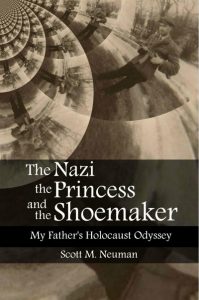The Nazi, the Princess, and the Shoemaker, My Father’s Holocaust Odyssey
The Nazi, the Princess, and the Shoemaker, My Father’s Holocaust Odyssey, by Scott M. Neuman, edited by Adi J. Neuman. An independent publication, 2019.
On the first page of this book there is a dedication: “This book is dedicated to my father, my family that lost their lives in the Holocaust, the Jews of Radziejów [Western Poland; German Rädichau], and all the Jews that were murdered by the Nazis.” The reader can only be grateful for the new methods of book publishing known as POD or print on demand, as otherwise invaluable books like Scott M. Neuman’s (and Child of the Forest) may not have come into publication and circulation for a very long time. The author was assisted in the process by his son, Adi Neuman.
The book came out of Scott Neuman’s interviews with his father, Binem Naiman, in the early 1980’s and these were produced on five 90-minute audio cassettes. Fortunately, notes the author, the old tape recorder worked flawlessly 30 years later, as did the tapes. In 1996, his father had also been interviewed by a member of the Shoah Foundation – founded by Steven Spielberg – Margaret Liftman, for Survivors of the Shoah, Visual History Foundation. Throughout the book, the author’s father (1919-2003) is referred to by his Polish name, Binem Naiman, although his Hebrew name was Simcha Bunim Najman. Binem’s mother was Hinda Najman (her family name was Poczciwy) and his father was Shimon Naiman, a Talmudic scholar who developed a lifelong devotion to daily studies of the Torah. As Chassidim to the region’s Rebbe or Rabbi, he also took on many community responsibilities. After marrying Hinda, Shimon Naiman set up shop in their town of Radziejów and this led to a successful shoe and leather business. The family grew to eleven children. Before the war, two of Binem’s older brothers immigrated to the United States (Milwaukee, Wisconsin), Harry in 1921 and Max in 1924.
At the conclusion of his final interview with his father, Scott Neuman was disappointed with himself for not realizing the magnitude of his father’s suffering as a result of the Holocaust. “I stared at my father, feeling proud that I was a son of such a man. As I had discovered, my father’s experience was unique and extraordinary, even among Holocaust survivors … I declared that it would be a tragedy if his account was lost … It felt as if I had been entrusted with a sacred treasure.” Scott Neuman brings the young Binem Naiman and his unique odyssey to life. So real does the young Binem become that the reader may be momentarily taken aback when the author suddenly quotes the older Binem responding to the interview questions.
The author devotes four full accounts to The Town of Radziejów, My Father and His Family, (Binem’s mother, Hinda, died when he was only a few years old; Shimon died peacefully at home before the worst events began), Jewish Life in Radziejów and Poles and Jews. The section on The Winds of War begins ominously. “In the early 1930’s, a clear change in the relationship between Jews and Poles could be observed … The anti-Semites in Radjiezów harassed Jews both physically and psychologically.”
World War II broke out on the day that Germany invaded Poland, on September 1, 1939, and Radziejów was a mere hour’s drive from the border with Germany. The systematic, step-by-step plan to eradicate the Jewish people was gradually put into effect in the small Polish town. The Jews had just completed building their new Beis Rochel Synagogue, their Shul, but it was soon destroyed. More »
